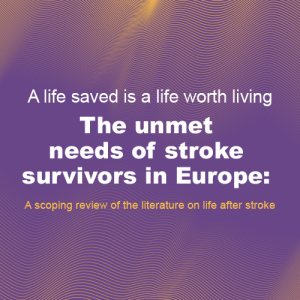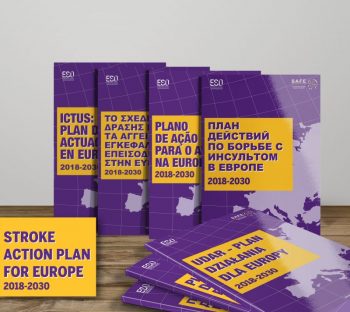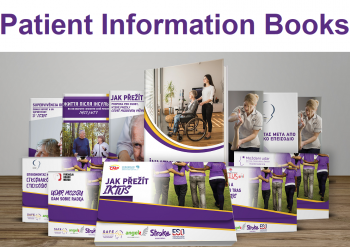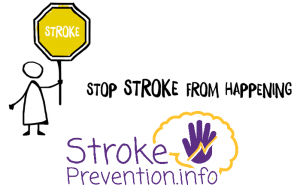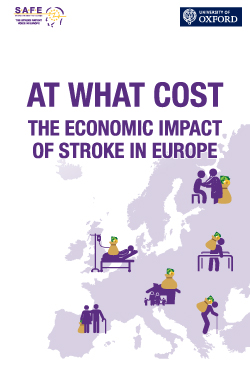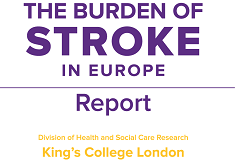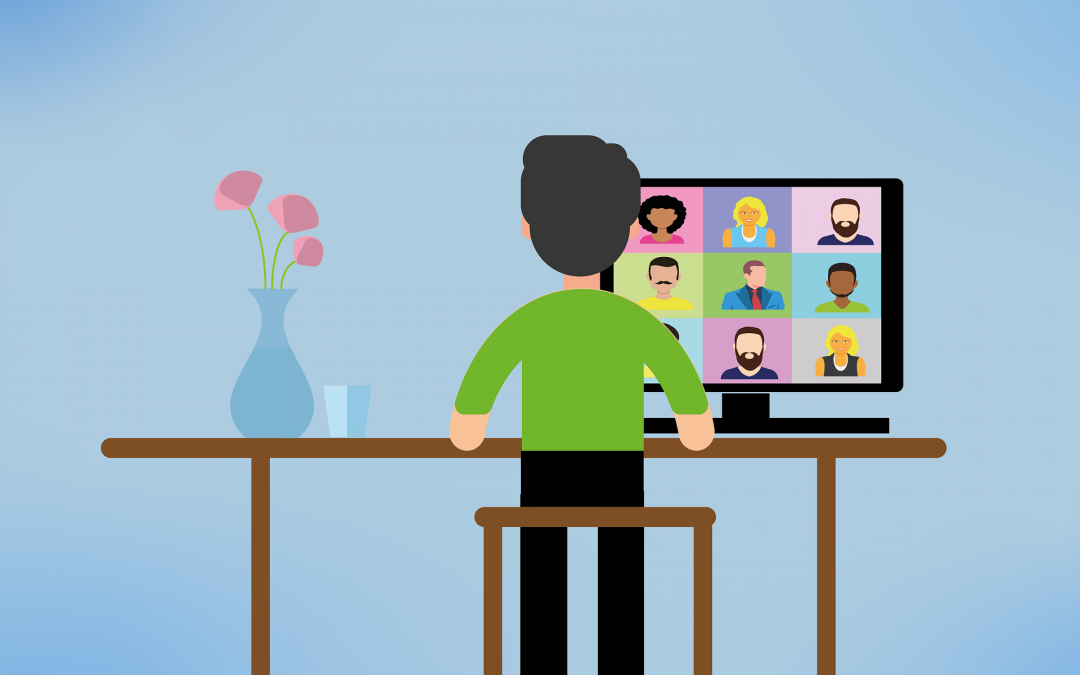
Oct 26, 2020
We are excited to announce the first ever European Life After Stroke Forum is going virtual.
With so much uncertainty in the midst of the COVID-19 pandemic, we can now ensure that this important event will be able to go ahead and be accessible to many more delegates across Europe.
If the ELASF is not already in your calendar, make sure you add 12 March 2021 and watch this space for more information in the next few weeks.
We’ll be will post regular updates on our website, including how to register, on our website and on social media, in the coming months. If you would like to know more – why not follow us on Twitter @StrokeEurope #ELASF or sign up to our enewsletter for regular updates
Research and investment in all aspects of the life after stroke care pathway has been neglected. This forum is unique and crucial in bringing together the latest research and needs of stroke survivors to contribute to the SAPE and ultimately improve life after stroke across Europe.
Image by Alexandra_Koch from Pixabay

Jul 1, 2020
Today we are launching a call for abstracts for the Ist European Life After Stroke Forum which will be held on 12 March 2021.
Our conference programme covers a range of topical issues in life after stroke as well as cutting-edge developments in response to COVID-19. The programme will comprise keynote lectures by eminent invited speakers supplemented by contributed talks and a poster session. Our draft programme is here.
We are now seeking abstracts for the Life After Stroke Forum, which may give those interested an opportunity to present either a ten-minute oral presentation or a poster presentation.
We are calling on for applications in two areas:
- Scientific applications: this may be for completed for ongoing trials and studies in the broad area of life after stroke.
- Grab and Steal: this is to share experiences of service developments in life after stroke where these original ideas and innovative practices could be used by others.
For more information on how to apply – click here.
“Life after stroke is a neglected area of the stoke care pathway. It is a particularly important issue for stroke survivors and their carers.
To address this issue, SAFE is organising a first of its kind event in Europe – a one day Life After Stroke Forum.
This will create an opportunity for those who have an interest in this area, whether from a research, policy, advocacy, or support oriented perspective, to come together to share and network.
As chair of the European Life After Stroke Forum scientific conference committee I am delighted that SAFE is launching its call for abstracts today. I am looking forward to receiving excellent applications, whether scientifically, or service development focused, from all over Europe”. Professor Avril Drummond
Image by mohamed Hassan from Pixabay
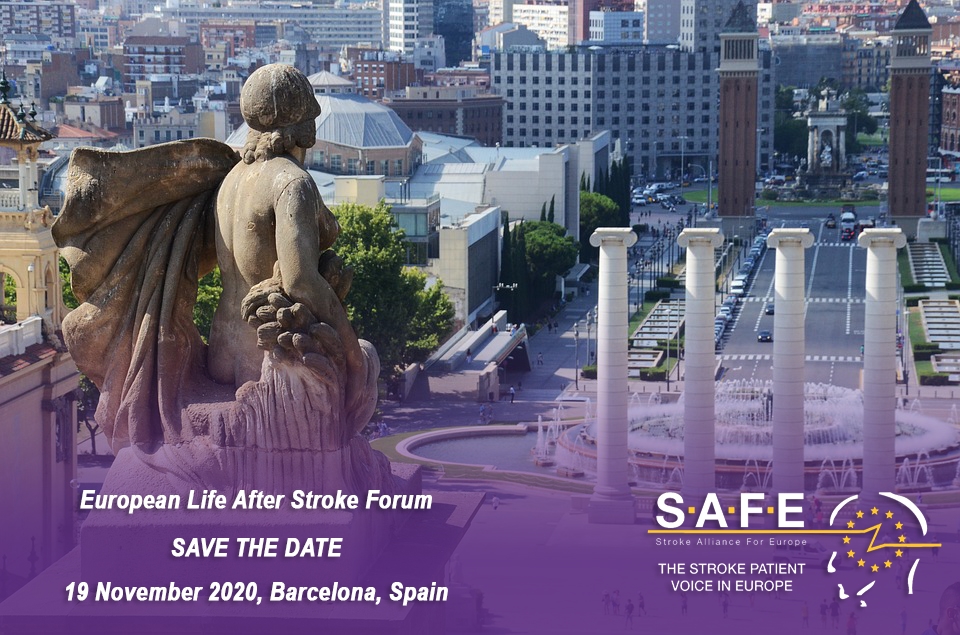
Feb 20, 2020
Life after stroke is a key priority within SAFE’s strategy. It is our pleasure to share with you the date of the first European Life After Stroke Forum – the 19 November 2020 in Barcelona, Spain.
This first European Life After Stroke Forum is driven by the need to implement the Stroke Action Plan for Europe and to create a network of stakeholders involved in professionally researching, advocating and providing evidence for improved life after stroke care.
SAVE THE DATE – EUROPEAN LIFE AFTER STROKE FORUM, 19 NOVEMBER 2020, BARCELONA, SPAIN
We hope we could get you to support the European Life After Stroke Forum by sharing this information with people you know.
When? 19 November 2020
Where? Hotel Catalonia Barcelona Plaza, Barcelona, Spain
Who can attend? Organisations and individuals who operate in the life after stroke area and are research, policy, advocacy or support oriented.
How to register? The registration link will be available soon. Stay tuned!
Please put this date in your calendar and stay tuned for more information that will follow.
We hope to welcome you to Barcelona,
SAFE team
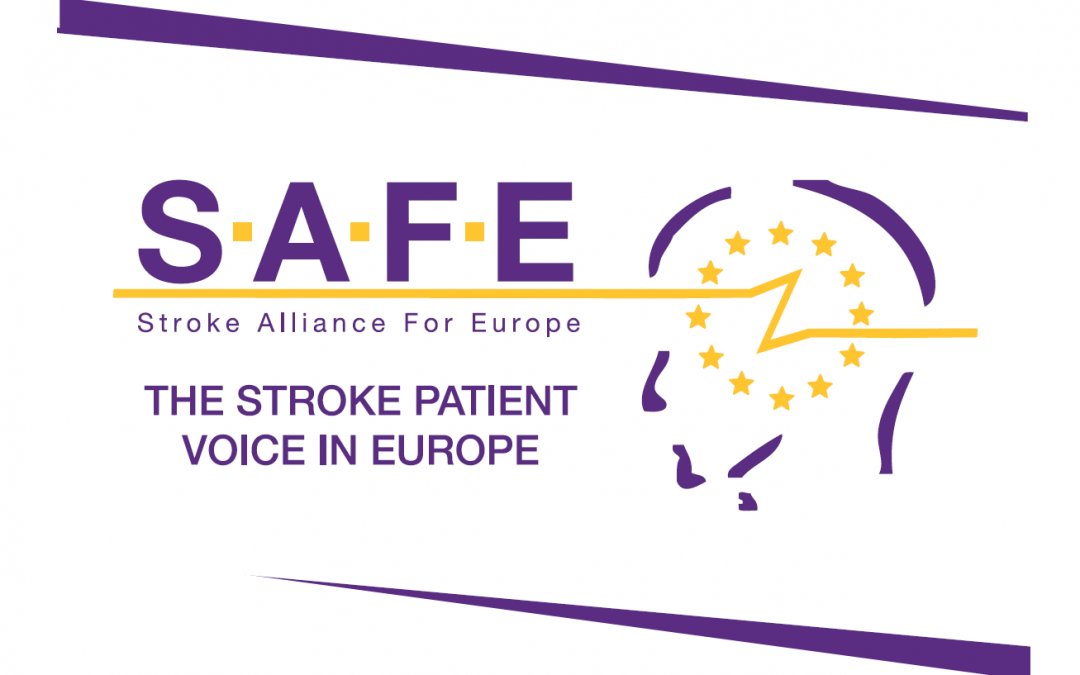
Oct 29, 2019
Brussels, October 29th, 2019– Based on insights gathered over the years, the Stroke Alliance for Europe (SAFE) is announcing the first ever European event dedicated solely to life after stroke.
Research and medical attention into the areas of primary prevention and intervention at the point of stroke occurring is an understandable priority, yet for millions of people surviving a stroke results in poor quality of life which may last for decades. In all of this, we must not forget that a life saved must also be a life worth living, and in various parts of the world there is an increasing realisation that the care pathway for stroke needs to take a more integrated approach.
To address this issue, SAFE has committed to organising a first of its kind event in Europe in 2020 – a Life After Stroke forum, for scientists, stroke survivors and their carers, medical professionals and health policy makers.
SAFE has recruited Professor Avril Drummond from School of Health Sciences, University of Nottingham, UK, as the role of Chair of the Scientific Committee, and we had the pleasure of talking to her about this this key event.
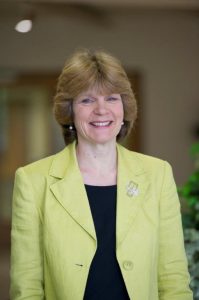
Professor Avril Drummond
Professor Drummond, you chaired the life after stroke domain within the Stroke Action Plan for Europe 2018 – 2030. What is your takeaway from that experience?
I think, first and foremost, the fact that we have this domain in the Stroke Action Plan for Europe included is a fantastic step forward. The recognition of the needs of stroke survivors and their families after their hospital and rehabilitation care, has not previously been given the focus it deserves.
It is in the period after return to the home that the struggle for a new life occurs, which is often characterised by stroke survivors as being cast adrift to find their own way, through maybe decades of cognitive, communication, relationship, financial, mental and physical health issues, complications and changes.
However, there is a lack of research studies into life after stroke covering the entire lifespan and this is something that needs to change. There are growing numbers who believe that pain, depression, relationship breakdown, secondary prevention effectiveness, financial, vocational and stigma issues, as well as the ongoing matters of daily living, mobility, communication, cognition and the absence of ongoing review and support are worth being researched and addressed.
By creating the European Life After Stroke Forum, we are recognising the need to consider this neglected area of the care pathway in a holistic fashion. In addition, the event will put a human face on the consequences of stroke, and on the consequences of not addressing prevention and treatment in the first place.
We are honoured to have you chairing the expert committee for this event. Can you give our readers more insight into the European Life After Stroke Forum?
It is still very early days, but the first steps have been made. The plan is to hold this event towards the end of 2020. We are forming a group of people committed to creating this event, as an opportunity for research, policy, advocacy, or support oriented individuals to come together, to share knowledge and network.
We expect to be able to announce more details on this event’s programme, speakers and topics in the summer of 2020. For more information stay tuned and follow the news on SAFE website.
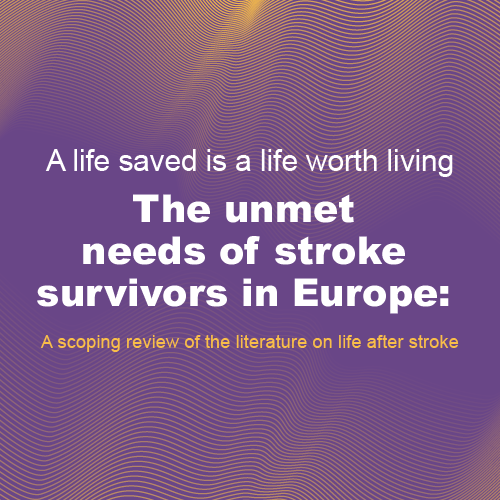
Mar 1, 2023
Literature review of unmet needs of stroke survivors reveals huge gaps in evidence
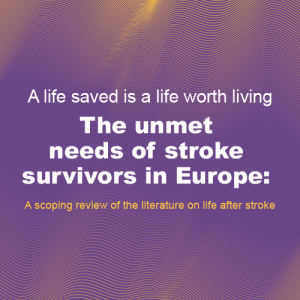
A new report A life saved is a life worth living – the unmet needs of stroke survivors in Europe, is launched at the European Life After Stroke Forum on Friday 10 March 2023, revealing the unmet needs of stroke survivors and huge gaps in evidence.
We commissioned King’s College London, to undertake a comprehensive literature search into the needs and unmet needs of stroke survivors in Europe.
For the report, the researchers developed an eight-level socio-ecological model based on The World Health Organisation’s International Classification of Functioning, Disability and Health (ICF) Core Set for Stroke and used this as a guide to identify and synthesize the literature on needs and unmet needs and to present our findings.
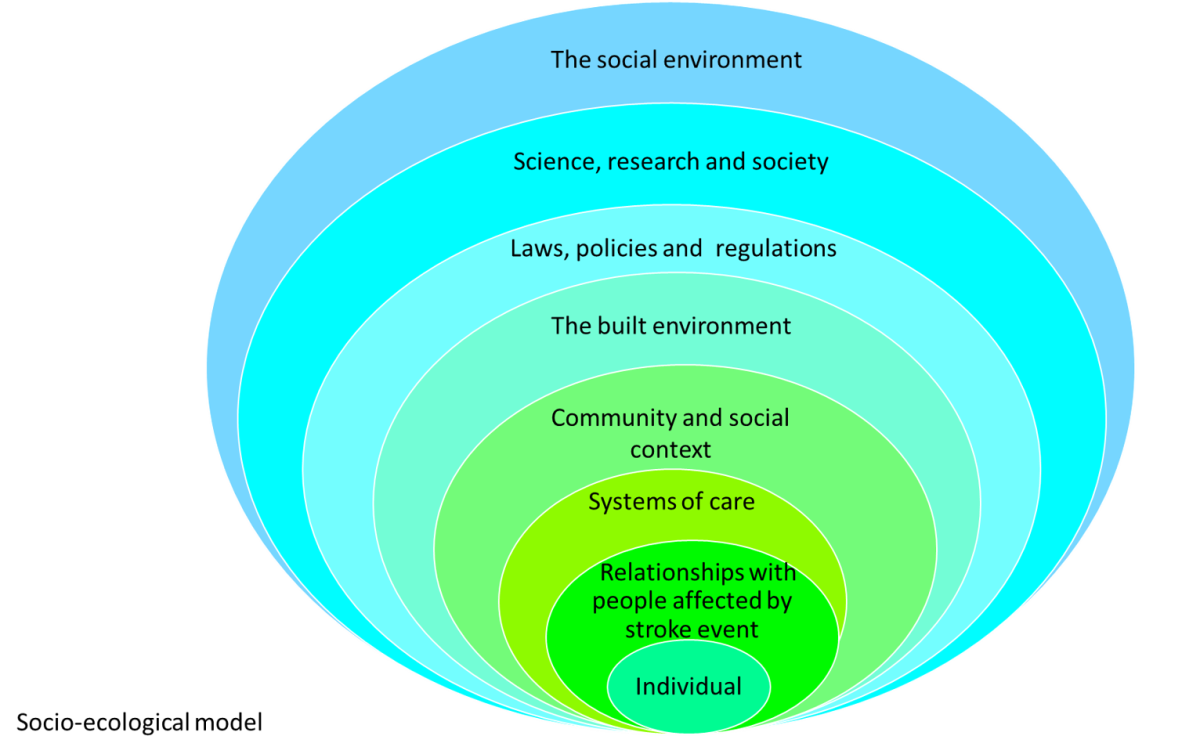 With the exception of the Body Function domain, the report authors found relatively little evidence on needs. Research reporting on the levels of the socio-ecological model covering issues not related to the individual were also sparse. This bias reflects the clinical practice and research interests of healthcare professionals, or the disciplinary backgrounds of researchers conventionally funded in stroke research. In addition to this bias, there is still a severe lack of studies that aim to provide estimates of stroke-related disability, functioning and health trends in adults living with stroke in Europe. And while there is a considerable amount of literature on self-reported unmet needs, there is inconsistency and sometimes a lack of clarity in how needs are categorised and reported across these studies.
With the exception of the Body Function domain, the report authors found relatively little evidence on needs. Research reporting on the levels of the socio-ecological model covering issues not related to the individual were also sparse. This bias reflects the clinical practice and research interests of healthcare professionals, or the disciplinary backgrounds of researchers conventionally funded in stroke research. In addition to this bias, there is still a severe lack of studies that aim to provide estimates of stroke-related disability, functioning and health trends in adults living with stroke in Europe. And while there is a considerable amount of literature on self-reported unmet needs, there is inconsistency and sometimes a lack of clarity in how needs are categorised and reported across these studies.
There is an urgent need for more research, especially covering the environmental, activities and participation domains, if the Stroke Action Plan’s section on Life After Stroke is to be implemented.
The report also highlights the lack of research onto possible interventions to meet or alleviate the unmet needs of stroke survivors and their carers. Research questions relating to psychological/emotional health, cognitive function, communication and fatigue have been identified as top research priorities by consensus-based priority setting exercises such as those conducted for the European Stroke Action Plan and UK Stroke Association/James Lind Alliance Priority Setting Partnership (involving stroke survivors, carers, health and social care professionals) stroke.org.uk/research/priority-setting-partnership
There are evidence gaps relevant to identifying and managing those with stroke who are at risk of suicide: strategies to identify suicidal ideation, particularly in people who do not meet clinical criteria for depression, and effective interventions. This topic is not generally mentioned among research priorities. This review cites evidence that stroke survivors’ risk of suicide attempt and death by suicide is around twice that of the general population, so there is an obvious need for action to prevent this loss of life and repercussions.
Priorities for research into interventions to benefit carers should also be clarified.
This review backs up the European Stroke Action Plan when it raises gaps in evidence across the post-acute stroke care pathway, including in community-based rehabilitation (restoring body functions and enhancing participation in activities/community life), regular reviews of health and social needs, and secondary prevention. Secondary prevention information and services are among the most reported unmet needs, after rehabilitation. Gaps in ongoing secondary prevention care have been identified across Europe, including lifestyle management programmes, access to some medications which help to control clinical risk factors, and face to face follow up in hospital or in primary care.
The European Stroke Action Plan highlights important contributing factors to gaps in care including a lack of robust data on longer term stroke management/care, and the associated problem of a lack of reference to life after stroke in national guidelines. The evidence presented in this report underscores the need to implement existing evidence-based guidelines and identify models of best practice which can be applied in (other) European countries.
Methods-section-A-life-saved-is-a-life-worth-living
References-by-section-A-life-saved-is-a-life-worth-living
The full report will be published later in the year.








 With the exception of the Body Function domain, the report authors found relatively little evidence on needs. Research reporting on the levels of the socio-ecological model covering issues not related to the individual were also sparse. This bias reflects the clinical practice and research interests of healthcare professionals, or the disciplinary backgrounds of researchers conventionally funded in stroke research. In addition to this bias, there is still a severe lack of studies that aim to provide estimates of stroke-related disability, functioning and health trends in adults living with stroke in Europe. And while there is a considerable amount of literature on self-reported unmet needs, there is inconsistency and sometimes a lack of clarity in how needs are categorised and reported across these studies.
With the exception of the Body Function domain, the report authors found relatively little evidence on needs. Research reporting on the levels of the socio-ecological model covering issues not related to the individual were also sparse. This bias reflects the clinical practice and research interests of healthcare professionals, or the disciplinary backgrounds of researchers conventionally funded in stroke research. In addition to this bias, there is still a severe lack of studies that aim to provide estimates of stroke-related disability, functioning and health trends in adults living with stroke in Europe. And while there is a considerable amount of literature on self-reported unmet needs, there is inconsistency and sometimes a lack of clarity in how needs are categorised and reported across these studies.